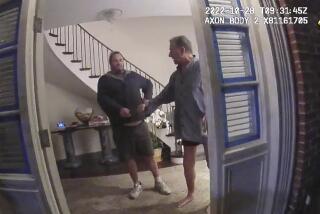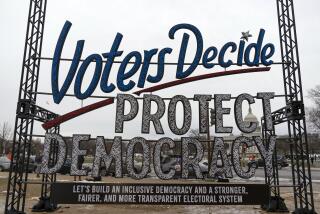Online conspiracy theory turns into real danger after armed man shows up at a Washington pizza parlor

By Monday, a stretch of busy Connecticut Avenue in northwest Washington seemed back to normal, a day after a gunman entered a pizzeria intent on rescuing children trapped in an imaginary sexual abuse ring that Internet conspiracists insist was run by Hillary Clinton and a chief aide.
But it was not back to normal, not with the threat still hanging and no way to brush it aside. The sexual abuse ring is fictional, District of Columbia police said, part of an explosion of made-up news. The danger is real.
“This is a growing national problem — fake news that takes a truly menacing and vitriolic turn, and then fuels this potential for violence,” said Bradley Graham, who with his wife, Lissa Muscatine, owns a popular bookstore down the block from Comet Ping Pong, the restaurant that patrons fled Sunday when a man arrived with an AR-15 assault-style rifle and another weapon.
It is also the latest collision of an information ecosphere careening into unknown territory, the guardrails meant to prevent disaster bent useless by the hatred and animosity of the recently concluded presidential campaign.
Like other fake news, the story has been given credence at the highest levels of the incoming administration. Michael Flynn Jr., the son of Donald Trump’s pick as national security advisor and chief of staff to his father, propelled the unfounded story on Sunday. Weeks ago, his father had promoted another false story that also linked Clinton to sexual abuse.
“Until Pizzagate is proven to be false,” the younger Flynn tweeted Sunday, using the conspiracists’ term for their concoction, “it’ll remain a story.”
Trump transition officials did not reply when asked about the episode.
By the rules of the conspiracists, Clinton and others are guilty of sexually abusing children unless they can prove their innocence.
But how do people prove they are not pedophiles, when those rushing to judgment don’t believe anything the targets say? How do people strip away scandalous rumors from the wild and lawless Internet?
The unfounded accusations against Clinton, campaign chairman John Podesta and the pizzeria’s owner, James Alefantis, had been a concern for weeks. The restaurant’s workers were threatened, and the threats spread to nearby businesses.
On Sunday, store owners lamented that their concerns were not taken seriously enough. That day, police say, Edgar Maddison Welch, a 28-year-old from Salisbury, N.C., strode into Comet Ping Pong with his weapons.
Welch “read online that the Comet restaurant was harboring child sex slaves and that he wanted to see for himself if they were there,” police said.
He told police “he was armed to help rescue them” and “surrendered peacefully when he found no evidence that underage children were being harbored in the restaurant.” No physical injuries were reported.
The genesis of the story was one of Podesta’s purloined emails, which were released by WikiLeaks during the campaign. In it, restaurant owner Alefantis offered to hold a fundraiser for Clinton and asked whether Podesta could attend.
On the Internet, some decided that the everyday words in the email were code for a child sex abuse ring, even if there was no evidence of wrongdoing.
Social scientists say the flurry of rumor-mongering — and, ultimately, Welch’s arrival at the restaurant — stem from a modern culture in which sources of news are no longer trusted and the vacuum has been filled by those spreading falsehoods.
Aram Sinnreich, an associate professor at American University in Washington, likened the Comet pizza accusations to assertions that the Sept. 11 attacks were an inside job and that the mass killings of children at Sandy Hook Elementary School in Connecticut in 2012 were faked.
“A significant portion of the online population is resistant to traditional methods of establishing what is true and what isn’t,” he said. “That’s a much bigger problem than Pizzagate or any one case. That’s a problem that challenges the mechanisms of a civil society.”
Sinnreich said he is skeptical that there’s any swift way to deal with the disregard for truth or underlying factors, like Americans’ distrust of their leaders. He likened the current environment to a body under siege from new and fearful bacteria.
“There’s no intellectual penicillin out there that will knock the infection out,” he said.
The advent of the Internet, with its hubs of people with myriad interests of fact and fiction, supercharged the ability to spread misinformation, said Karen Kovacs North, a professor of digital social media at USC.
“There have always been and always will be people who question truth or facts,” she said. “It used to be that they could not find like individuals.”
Now, people who share their viewpoint are easier to find than ever, and in many cases it’s from those people that news is received, already salted with “facts” of unknown origin or credibility.
At the White House on Monday, Press Secretary Josh Earnest said that such false reports had a “corrosive effect … on our political debate.”
“It’s deeply troubling that some of these false reports could lead to violence,” he said.
On Connecticut Avenue on Monday, five young boys peered into the windows of Comet — “a delicious pizzeria where everyone is welcome!” it bills itself — to see only a few employees inside. Owner Alefantis said in a statement that the restaurant would reopen soon.
“There will be a time and place to address how and why this happened in greater detail,” he said. “For now, I will simply say that we should all condemn the efforts of certain people to spread malicious and utterly false accusations about Comet Ping Pong, a venerated D.C. institution. Let me state unequivocally: These stories are completely and entirely false, and there is no basis in fact to any of them.”
The curious boys walked on. One of them asked a question of an older man accompanying them.
“Conspiracy is an idea that doesn’t hold up,” the man said.
But on Sunday it had held up enough to create fear and chaos, with no solution in sight.
Twitter: @cathleendecker
Trump brings Koch network’s green-energy foes from the fringe to the center of power
Trump’s call with the Taiwanese president was his latest break from diplomatic norms
Trump to preside over the richest Cabinet in U.S. history
More to Read
Get the L.A. Times Politics newsletter
Deeply reported insights into legislation, politics and policy from Sacramento, Washington and beyond. In your inbox three times per week.
You may occasionally receive promotional content from the Los Angeles Times.








